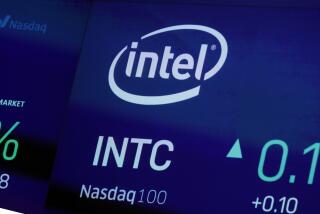Coke Will Slash 21% of Worldwide Work Force
- Share via
Coca-Cola Co.’s new boss, moving quickly to put the fizz back in Coke’s stale earnings and sales growth, on Wednesday unveiled a sweeping restructuring that includes the biggest job cuts in the soft-drink giant’s 113-year history.
Coke’s incoming chairman, Douglas Daft, said the company plans to use layoffs and attrition to slash about 6,000, or 21%, of the company’s 29,000 global employees--2,500 of them at the company’s Atlanta headquarters.
The move is aimed at cutting costs and boosting earnings; Coke posted a fourth-quarter loss on Wednesday. The restructuring also is intended to streamline the company and give Coke’s line managers around the world more autonomy to better serve their markets.
Coke, a component of the Dow Jones industrial average, joins several other stalwarts of U.S. industry--multinational companies whose growth rates once seemed unshakable--that have undertaken massive overhauls to kick-start their now-sluggish results.
Familiar names such as McDonald’s Corp., Gillette Co., Philip Morris Cos., Xerox Corp. and Eastman Kodak Co. also have been going through a series of restructurings in an effort to reestablish the undisputed leadership they once had over their respective industries.
But whereas such sweeping moves often encourage Wall Street and boost the company’s stock price, Coke’s stock fell after the announcement. The stock dropped $2.81 a share, to $63.06, in New York Stock Exchange Stock Exchange composite trading.
Coke’s restructuring also is part of Daft’s bid to quickly boost Coke’s reputation and market leadership in the aftermath of several problems that have left Coke reeling in recent months--including turmoil in its executive suite.
Daft, a native of Australia who has spent most of his 30-year career at Coke overseas, was tapped to be chairman and chief executive, effective in April, following the abrupt resignation in December of M. Douglas Ivester, who spent two turbulent years in the job.
Coke’s stock--once so steady a performer that billionaire stock-picker Warren Buffett and his Berkshire Hathaway Inc. became Coke’s biggest stockholder--is up only 3% for the past 12 months, while the bellwether Standard & Poor’s 500 Index has risen 12%.
Wednesday’s stock drop was in good part because Daft, in simultaneously announcing Coke’s fourth-quarter financial results, also indicated that Coke’s bottlers in certain overseas markets are flush with too much inventory of the soda pop’s concentrate, some analysts said.
In turn, that means Coke will be shipping less concentrate this year and that will reduce the company’s per-share diluted earnings by about 11 cents to 13 cents in the first half of 2000, Daft said.
So “the feeling out there [among investors] seems to be that that inventory should not have been shipped in the first place, and that the company’s earnings in prior periods were therefore overstated,” said analyst David Goldman of Banc of America Securities in San Francisco.
The stock’s retreat reflected that “people were stunned by the sheer size of the job cuts” that Coke said it would need to improve its results, Goldman said.
Daft also said he may lower projections for Coke’s long-term performance. Current targets for annual gains of 7% to 8% in sales and 15% to 20% in earnings are “a little on the high side,” he said.
Coca-Cola said it would take a pretax charge of about $800 million this year to account for the restructuring and other organizational changes.
As for the fourth quarter, Coke posted earnings of 31 cents a share, excluding one-time gains and charges. With those items included, Coke reported a net loss of $45 million, or 2 cents a share, compared with year-earlier profit of $597 million, or 24 cents a share. Its revenue rose 11% to $4.9 billion.
But Coke’s struggle was reflected in its case shipments, which grew only 2% worldwide for all of 1999, though they exceeded 16 billion cases for the first time in Coke’s history. Still, shipments in the U.S. market alone inched up only 1% from the prior year, which Coke acknowledged “was below historic growth levels.”
Those growth levels reached stellar heights in the 1970s and ‘80s under the leadership of Roberto Goizueta, a Cuban immigrant and master strategist who widened Coke’s industry leadership over archrival PepsiCo Inc., sharply improved Coke’s earnings and sales growth and sent its stock soaring.
Goizueta died in October 1997, and was replaced by Ivester, who seemed to run into one problem after another. Because most of Coke’s earnings come from outside the U.S. market--it does business in 200 countries--the economic problems in Asia, Russia and elsewhere eroded its profit and disillusioned investors.
Coke also has faced a racial-discrimination lawsuit, and it angered many bottlers by raising concentrate prices. Also, it came under fire for poorly handling a contamination scare involving its soft drinks in Europe last year.
Daft, in fact, said the European mess was “a wake-up call” that made the company realize it was not well-prepared to respond to local markets around the globe. Daft currently is Coke’s president and chief operating officer.
But analyst Goldman said giving more autonomy to local field managers carries a big risk: Namely, that “we won’t know for the next nine or 12 months whether all of the right people are in the right positions” in Coke’s far-flung empire. “One of the greatest risks he faces is that he’s moved so quickly, and whether there are some people on the ground who can’t do the job.”
Daft said in a statement that the job cuts are “painful” and that Coke is “committed to proceeding with care and sensitivity” for those being laid off. The company plans to offer severance packages, job counseling and other services, he said.
Coke said the restructuring will yield about $300 million in annual cost savings once it’s completed.
*
Times wire services were used in compiling this report.
* BOTTOM LINE: Profit rose at Philip Morris, the world’s largest tobacco company. C3
(BEGIN TEXT OF INFOBOX / INFOGRAPHIC)
Struggling to Grow Again
Coca-Cola on Wednesday announced deep job cuts as it struggles to restore sales and earnings growth. Coke’s annual sales rose just 9% between 1995 and 1999. Other U.S. multinational companies, including Gillette and Eastman Kodak, likewise have seen sales stall or decline in recent years amid rising competition and the Asian economic crisis. The problems have left the companies’ shares badly lagging the broad market’s advance. Monthly closes and latest for the three companies and the Vanguard Index 500 stock fund, which tracks the Standard & Poor’s 500 index:
*
Source: Bloomberg News
Struggling to Grow Again
More to Read
Inside the business of entertainment
The Wide Shot brings you news, analysis and insights on everything from streaming wars to production — and what it all means for the future.
You may occasionally receive promotional content from the Los Angeles Times.











